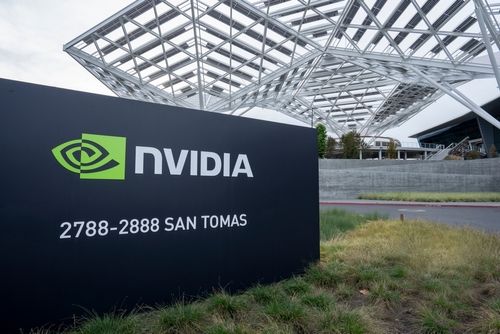
Nvidia’s third-quarter earnings provided a temporary boost to the struggling AI-driven stock rally on Thursday—though the optimism proved short-lived as fears of an AI bubble quickly resurfaced.
The chipmaker’s strong results initially lifted tech and semiconductor stocks, with Nvidia shares climbing as much as 5% in early trading. The rally helped reverse some of the recent pessimism around artificial intelligence investments, pushing the Dow up by as many as 700 points and lifting the S&P 500 and Nasdaq more than 1%.
However, the gains faded by midday. All three major indexes turned lower, and even Nvidia gave up its early advance, dipping into negative territory.
A stronger-than-expected September jobs report also provided a brief lift to market sentiment. But the momentum stalled as traders assessed the likelihood of a Federal Reserve rate cut in December, which remained below 50% according to the CME FedWatch Tool.
Nvidia’s performance had been highly anticipated amid growing concerns over soaring AI stock valuations and heavy capital expenditure in the sector. The company, widely seen as a bellwether for AI demand, delivered a robust quarter with revenue of $57 billion—a 62% increase from a year earlier. Its data center unit posted $51.2 billion in sales, up 66% year-over-year.
The chip giant also issued an upbeat forecast, projecting $65 billion in revenue for the current quarter, well above analyst estimates.
“It has been many decades since one stock could move the market like Nvidia,” said David Rosenberg, president of Rosenberg Research. “The results kyboshed the malaise in the growth of the past several weeks.”
Dan Ives of Wedbush Securities echoed the sentiment, calling Nvidia “the foundation for the AI Revolution” and praising CEO Jensen Huang’s commentary on enterprise demand.
Still, not everyone is convinced the AI boom is sustainable. Rosenberg, a longtime skeptic, cautioned that the sector remains in a “bubble of epic proportions,” questioning whether the AI market can grow eightfold over the next five years as current valuations imply.
While Nvidia’s earnings offered a moment of reassurance, the swift return of selling pressure underscores how fragile investor confidence remains in the high-stakes AI trade.
The above content was completed with the assistance of AI and has been reviewed by an editor.


